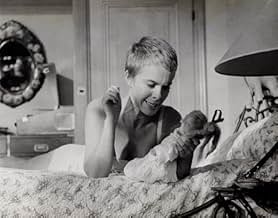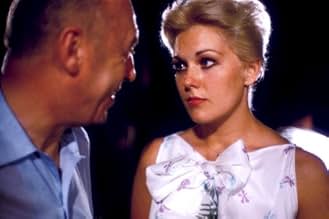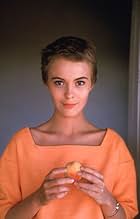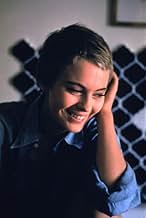IMDb RATING
6.8/10
6.2K
YOUR RATING
Spoiled Cecile, 17, spends her summer at the French Riviera with her rich, widower, playboy dad and Elsa. Anne, her late mom's friend, visits and brings changes to all.Spoiled Cecile, 17, spends her summer at the French Riviera with her rich, widower, playboy dad and Elsa. Anne, her late mom's friend, visits and brings changes to all.Spoiled Cecile, 17, spends her summer at the French Riviera with her rich, widower, playboy dad and Elsa. Anne, her late mom's friend, visits and brings changes to all.
- Nominated for 1 BAFTA Award
- 2 nominations total
Tutte Lemkow
- Pierre Schube
- (uncredited)
Maryse Martin
- Undetermined Secondary Role
- (uncredited)
Edouard F. Médard
- Bit part
- (uncredited)
Jackie Raynal
- Dancer
- (uncredited)
- Director
- Writers
- All cast & crew
- Production, box office & more at IMDbPro
6.86.1K
1
2
3
4
5
6
7
8
9
10
Featured reviews
a reflection on Seberg
This is an absorbing, intriguing and slightly bizarre film. I agree with the other comments here - the camera work is beautiful, the Riviera looks fab, Seberg is startling, and David Niven (how come no-one's mentioned his performance yet?) is a particularly slimy, lecherous old man. Seberg really does deliver an excellent performance. She's a fascinating person anyway, and here her ambiguity, her modernity, her beauty and her youth all come into their own. And the title song's fab too! Well worth a watch, if only to revel in the stunning scenery and Seberg's haunting screen presence.
Preminger in transition
A fascinating, frustrating, though ultimately deeply satisfying film. Many readers have commented on the frustrations, and they are hard to deny. My experience of this movie goes back to the early 70s, when I first encountered it in ideal circumstances, at the Museum of Modern Art during its complete Preminger retrospective, and in a gorgeous, perfect print. A great introduction to a film whose very meaning resides in its glossy surface. The first few minutes of the film powerfully set up the tragedy that is to come: Saul Bass's dripping teardrop titles underscored with Auric's deeply tragic music, followed by the first black and white scenes depicting Cecile's current active but deeply disengaged life. Then, as Cecile arrives home and begins remembering "last summer", the blue Mediterranean sea begins to invade the frame, little by little -- a striking effect, to say the least --, we are there, in the midst of a carefree vacation with Cecile, Raymond and Elsa, and quite successfully invited to forget the tragedy that seems to be in the making and enter a carefree, sunlit world where nothing, seemingly, could ever go wrong. Masterful film-making, and, thus far, perfectly pitched: Seberg's perfectly expressionless and beautiful face has no small part in making it work. That she is less secure in the flashback scenes is unfortunate, but her physical presence at least gives the right signs: this is a very young girl, happy but extremely shallow. (Yes, I will admit that the line readings are quite stiff -- no question she is "acting." But, if one is already in the proper frame of mind they are not all that damaging.) What's important is the holiday mood, and the performances of Niven and Mylene Demongeot are sufficiently effervescent to evoke it. (Demongeot is a real charmer -- beautiful beyond belief and full of joie de vivre.) The arrival of Deborah Kerr on the scene changes all this: a dignified Lady coming into the midst of a world she finds immoral, distasteful and, in the deepest sense, unacceptable: her reaction to realizing that Raymond is, shall we say, shacking up with Elsa is the turning point of the film, the crossroads of comedy and tragedy. And from this point we are invited to see how, step by step, comedy turns to tragedy. What's most wonderful about this film is how diverting that progression is. The world of the French Riviera is, after all, a world of carefree bliss (at least on the surface), and we are given ample opportunity to enjoy that along with the characters in the film: a delightful casino scene (enlivened by the presence of that wonderful actor, Walter Chiari, a truly handsome man with a wonderful flair for comedy, and here, playing opposite Demongeot, particularly delightful) and a visually stunning dance at the dock, a masterpiece of costume design in delicious color and Cinemascope, worthy of a Minnelli musical (and, in its delirious scale, surpassing most of them). Finally, let me just say that the final moments of the film (and I will refrain from spoiling them) are among the most moving in all cinema: an evocation of self-loathing and emptiness that remains unrivaled in its beauty. Yes, beauty. Caveat emptor: It is useless to see this film in the pan&scan version (I have had the experience, and it is horrible). The Columbia DVD edition looks great (absolutely NO extras, by the way; it appears to have been simply dumped on the market -- odd treatment of a masterpiece). Oh, yes, my title heading: Preminger's previous films had mostly dealt with "little" events -- noirs, small comedies, etc.; most of his subsequent films ("Exodus," "The Cardinal," "Advise and Consent," "In Harms Way") with Big Events. This one is still on an intimate scale, but has much in common visually (particularly the masterful use of CinemaScope, to which Preminger took like a fish to water) with the later films.
Iconic Film of the 1950s
The wonderfully fresh and vivacious Jean Seberg here shines in her second film. The previous year she had played Joan of Arc (chosen from 18,000 young girls who auditioned for the role), and here Otto Preminger directs his protégé again to superb effect. The film opens with very dramatic music by Georges Auric. This film is based upon the best-selling first novel by the young Francoise Sagan, which created a scandal then but now is not scandalous at all. What passed for 'decadence' at the time was a life of aimless idling by the rich on the Riviera, some gambling, some boating, some swimming, some affairs, and a great deal of insipid self-indulgence. This we see epitomised in Seberg's father, played to perfection by David Niven, a shallow idler and womanizer who straightens his bow tie self-consciously between seductions in the bushes. He and Jean have a 'father-and-daughter-thing' because her mother died long ago, and they really don't want anybody else in their lives apart from casual partners with whom they can romp, only to throw them away when used, joking about them to each other as they get ready to have an evening out. As the film opens, Niven's girlfriend of the moment is Elsa, a charmingly empty-headed creature played delightfully by Mylene Demongeot, who shows such talent as a restrained comedienne. Juliette Greco makes a full-throated appearance in a club, singing the film's theme song all the way through as the dancing and whirling Jean stares at her glassy-eyed over men's shoulders, lost in haunted visions of regret. In 1958, the teenage girls of Britain all swooned over and identified with Jean Seberg, who seems to have originated the shorn boyish haircut which Mia Farrow later copied. Niven as the amiable cad was pretty much what one would expect. But into this mix comes Miss Straight, in the form of Deborah Kerr, who says to Niven when he gets flirty: 'I don't want to be casual.' That's for sure. When Niven finally decides he wants to marry her, she becomes a Little Hitler in no time, bossing Jean around, stopping everyone having 'fun', and generally making herself odious with her control-freakery. This leads to a campaign to drive her out by Jean and Elsa, who has been unceremoniously dumped. Meanwhile, Kerr has fallen hard, and in a revealing shot in the harsh sun we even discover that her true complexion was rather gingery and freckly, something concealed in her other films. Tragedy is not long in coming, hence the 'tristesse'. This is a social document of the 1950s which people interested in knowing what things were once like should watch. The film is directed by a master, Preminger, and Jean Seberg 'makes it' entirely. She is so refreshing, natural, young, real. Poor Jean Seberg. By the age of 40 she was dead. But she left much to remember her by: no one who has seen 'Breathless' (1960) can ever forget her. This film too keeps her wonderful memory alive. Her best acting performance was probably in 'Lilith', but she does well enough here, wholly dominating the screen and acting circles round the old pros. Oh yes, and then there's the inside joke about Eveline Eyfel playing three identical sisters who act as the maid, which is an amusing touch. The Mediterranean sparkles in the sunshine, the pine trees along the beach are exuding their aroma, swim suits dry in minutes: come on in, the water's fine!
Otto Preminger's Rivera
Film makers love to show off the Rivera, and for good reason. It's one of the most spectacular venues in the world. However, it's interesting to compare Preminger's Rivera with those of Hitchcock in "To Catch a Thief" and Powell's in "The Red Shoes". In "The Red Shoes" the Riviera is merely a setting in which artists work obsessively to create their art while paying virtually no attention to it. For Hitchcock, the Riviera is a lush background for intrigue. In Preminger's "Bonjour Tristesse" the Riviera represents the lifestyle that the characters desire; luxurious, sensual, hedonistic and, ultimately, empty. "Bonjour Tristesse" is worth seeing for the Riviera, which looks fabulous, and Jean Seberg, who looks fabulous. However, the story is as shallow as the characters.
I do not think that it would be giving away the plot to say that the viewer is led to believe from the very beginning that he is seeing a tragedy. After all, the title translates as "Hello, Sorrow". Furthermore, the opening exposition, filmed in somber black-and-white, leads one to believe that the lives of the protagonists have been devastated by some great tragedy. However, from the very beginning it is also obvious that this impression is not true at all. The father and daughter are depicted as a pair of shallow, selfish, hedonists who care nothing for anything or anyone beyond each other and their own immediate gratification.
The story does not even mention exactly what, if anything, it is that the father does for a living. He is obviously extremely wealthy, but is never seen to do any sort of work or transact any business. It was apparently sufficient for the author that he should be nothing more than a rich, idle, middle-aged playboy who changes his cars as frequently as his daughter, who never wears the same outfit twice, changes her clothes.
In short, not only are the characters in this story not real people, they are not even sympathetic unreal people. It's bad enough having to put up with an hour and a half movie about mannequins without them having to be unlikable mannequins.
I do not think that it would be giving away the plot to say that the viewer is led to believe from the very beginning that he is seeing a tragedy. After all, the title translates as "Hello, Sorrow". Furthermore, the opening exposition, filmed in somber black-and-white, leads one to believe that the lives of the protagonists have been devastated by some great tragedy. However, from the very beginning it is also obvious that this impression is not true at all. The father and daughter are depicted as a pair of shallow, selfish, hedonists who care nothing for anything or anyone beyond each other and their own immediate gratification.
The story does not even mention exactly what, if anything, it is that the father does for a living. He is obviously extremely wealthy, but is never seen to do any sort of work or transact any business. It was apparently sufficient for the author that he should be nothing more than a rich, idle, middle-aged playboy who changes his cars as frequently as his daughter, who never wears the same outfit twice, changes her clothes.
In short, not only are the characters in this story not real people, they are not even sympathetic unreal people. It's bad enough having to put up with an hour and a half movie about mannequins without them having to be unlikable mannequins.
Sunshine with No Shadow
Reviews of this film are more interesting and thought provoking than most. A number of them convey critical insights that certainly deepened my appreciation. Yes, the film is flawed, but it also resonates beyond standard soap opera mainly because of its tragic central premise. That the movie doesn't fully realize its aim, I'm sorry to say, is largely because of limitations in Seberg's performance. I agree, she's a lively and compelling screen presence with a freshness that's genuinely appealing. However, the role of Cecile calls upon more emotional depth than Seberg manages to convey, especially with the absence of troubled emotions. Thus the sense of tragic outcome stems from sources other than Seberg's performance. Now, there are several ways of looking at Cecile's emotional make-up and maturity, but there's one I believe that most strongly recommends itself and also puts Seberg's performance in the best light.
On this view, Seberg has Cecile's character just right during the sunny Technicolor phase. Cecile is simply too immature to realize the potential consequences of her scheming actions. Thus, Cecile (Seberg) attaches no more gravity to breaking up her father's relationship than she does to skipping her studies. She's all spoiled selfishness wrapped in a winsome smile. And it's not until the car crash that she realizes the consequences of her selfish act, and experiences an emotional depth for the first time. Her scheme thus results not from making a wrongful choice but from not even realizing that a choice is being made. This view would vindicate nine-tenths of Seberg's unconflicted Technicolor performance, but not the black- and-white phase where Seberg fails to convey the conflict required. This view would also explain the added features of narration, color change and Saul Bass graphics once Preminger realizes that Seberg's performance is not enough to convey the necessary sense of tragedy.
Despite this central flaw, the movie remains oddly haunting. Maybe it's because of a sun- washed paradise so carelessly lost, or of a summer of such promise turned into a lifetime of regret. I really like the observation that father and daughter behave as though actions have no consequences. As a result, their humanity is only realized once the importance of this lesson is tragically driven home. Only by then, it's too late. In my view, the movie remains regrettably underrated.
On this view, Seberg has Cecile's character just right during the sunny Technicolor phase. Cecile is simply too immature to realize the potential consequences of her scheming actions. Thus, Cecile (Seberg) attaches no more gravity to breaking up her father's relationship than she does to skipping her studies. She's all spoiled selfishness wrapped in a winsome smile. And it's not until the car crash that she realizes the consequences of her selfish act, and experiences an emotional depth for the first time. Her scheme thus results not from making a wrongful choice but from not even realizing that a choice is being made. This view would vindicate nine-tenths of Seberg's unconflicted Technicolor performance, but not the black- and-white phase where Seberg fails to convey the conflict required. This view would also explain the added features of narration, color change and Saul Bass graphics once Preminger realizes that Seberg's performance is not enough to convey the necessary sense of tragedy.
Despite this central flaw, the movie remains oddly haunting. Maybe it's because of a sun- washed paradise so carelessly lost, or of a summer of such promise turned into a lifetime of regret. I really like the observation that father and daughter behave as though actions have no consequences. As a result, their humanity is only realized once the importance of this lesson is tragically driven home. Only by then, it's too late. In my view, the movie remains regrettably underrated.
Did you know
- TriviaOtto Preminger always liked this film, although he felt the American critics did not do it justice. The film was a qualified success in France, yet American critics felt the film wasn't French enough, a detail that amused Preminger.
- GoofsWe hear the Band at c.6'50" and we see a clarinet-player performing, but the music has no clarinet part whatsoever included at that point in the soundtrack. Later, when the clarinet does eventually join the soundtrack, the fingering of the player bears absolutely no relation to the music actually being heard.
- ConnectionsEdited into Histoire(s) du cinéma: Une histoire seule (1989)
Details
Box office
- Gross worldwide
- $446
- Runtime
- 1h 34m(94 min)
- Color
- Aspect ratio
- 2.35 : 1
Contribute to this page
Suggest an edit or add missing content






































